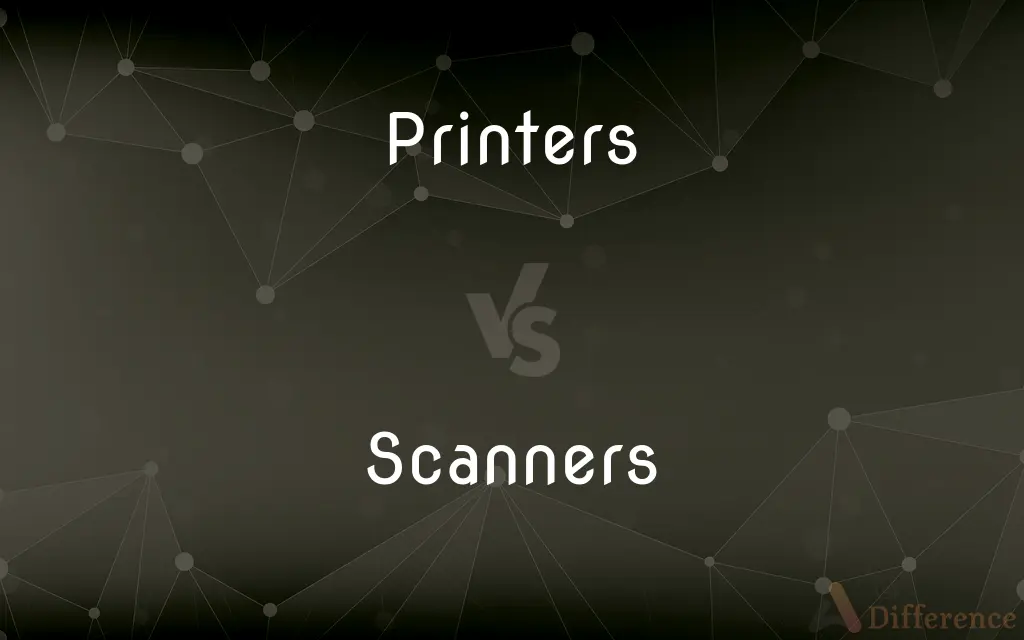Printers vs. Scanners — What's the Difference?
By Tayyaba Rehman — Published on November 8, 2023
Printers transfer digital content onto physical media, while Scanners convert physical content into a digital format.

Difference Between Printers and Scanners
Table of Contents
ADVERTISEMENT
Key Differences
Printers are devices designed to reproduce digital content onto physical media, most commonly paper. They interpret digital information and use ink or laser technology to create an analog representation. On the other hand, Scanners are designed to do the reverse. They take physical documents or images and convert them into digital data.
The fundamental function of Printers is output. They allow users to take what's on their screen and produce a tangible copy, whether it's a document, image, or design. Conversely, Scanners focus on input. They digitize physical items so users can view, edit, or send them electronically.
Various types of Printers, including inkjet, laser, and dot matrix, serve different purposes and have varying print qualities. Scanners also come in different forms like flatbed, drum, and handheld, each suitable for specific scanning tasks.
While Printers require consumables like ink or toner to function, Scanners don't necessarily need such supplies. Instead, Scanners use sensors and lights to capture the details of a document or image, converting them into digital files.
Modern Printers often come with built-in scanning functionalities, blurring the lines between the two devices. These are known as all-in-one or multifunction devices. However, standalone Scanners can offer higher resolutions and specialized scanning capabilities not found in combined units.
ADVERTISEMENT
Comparison Chart
Primary Function
Reproduce digital content on physical media
Convert physical content to digital format
Direction
Output
Input
Types
Inkjet, laser, dot matrix
Flatbed, drum, handheld
Consumables
Ink or toner
None, typically
Combined Devices
Often part of multifunction devices with Scanners
Often paired with Printers in multifunction devices
Compare with Definitions
Printers
Modern variants often include wireless printing capabilities.
Wireless Printers allow users to print directly from their smartphones.
Scanners
Can save scanned content in various file formats.
Using a Scanner, she saved her artwork as a high-resolution PNG file.
Printers
Devices that produce tangible copies of digital content.
Many offices rely on Printers to produce hard copies of documents.
Scanners
Devices that digitize physical documents or images.
Law firms use Scanners to store documents digitally.
Printers
Can produce text, images, or designs on various media.
Graphic designers use specialized Printers to get the best color reproduction.
Scanners
Can be flatbed, handheld, or drum types.
Flatbed Scanners are commonly used for scanning books and documents.
Printers
Can be categorized into inkjet, laser, and others.
Inkjet Printers are popular for home use due to their color capabilities.
Scanners
Use sensors and lights to capture content.
High-quality Scanners capture intricate details of photographs.
Printers
Require consumables like ink or toner.
Changing the ink cartridge is a routine maintenance task for Printers.
Scanners
Often paired with software for editing or enhancing scans.
Most Scanners come with software that helps correct color imbalances.
Printers
One that prints, especially one whose occupation is printing.
Scanners
One that scans
A scanner of newspapers.
Printers
A device that prints text or graphics on paper.
Scanners
A receiver that continuously broadcasts signals it detects from specified radio frequencies
Heard about the robbery over the police scanner.
Printers
A 3D printer.
Scanners
An optical scanner.
Printers
Plural of printer
Scanners
A device, such as a CT scanner or PET scanner, for observing internal organs, tissues, and other parts of the body.
Scanners
Plural of scanner
Common Curiosities
What do Printers primarily do?
Printers produce physical copies of digital content.
Can Printers also scan documents?
Many modern Printers, especially all-in-one devices, have built-in Scanners.
Why would someone need a Scanner?
Scanners allow users to digitize physical content for electronic storage, sharing, or editing.
What type of Printer is best for photos?
Inkjet Printers often provide high-quality photo prints.
Do wireless Printers need a physical connection?
No, wireless Printers can receive print jobs via Wi-Fi or Bluetooth.
Can Printers print on different materials?
Yes, some Printers can print on materials like fabric, vinyl, and cardstock.
Are color laser Printers suitable for photos?
While they can print photos, inkjet Printers often deliver better photo quality.
Can Scanners save in different file formats?
Yes, Scanners can often save in formats like JPEG, PNG, and PDF.
What resolution should I look for in a Scanner for high-quality images?
A Scanner with a resolution of 1200 dpi or higher is suitable for high-quality image scans.
How do Scanners function?
Scanners digitize physical documents or images into electronic formats.
Can Scanners work with mobile devices?
Many modern Scanners can connect with mobile devices either directly or through apps.
Do Printers always require ink?
No, laser Printers use toner instead of ink.
Why might a business need both Printers and Scanners?
A business might print documents for clients and scan paperwork for digital storage.
Can a Scanner capture color documents?
Yes, color Scanners can capture and reproduce the colors in documents and images.
How do Scanners convert images into digital formats?
Scanners use sensors and lights to capture and digitize content.
Share Your Discovery

Previous Comparison
Base Word vs. Root Word
Next Comparison
Hardness vs. FriabilityAuthor Spotlight
Written by
Tayyaba RehmanTayyaba Rehman is a distinguished writer, currently serving as a primary contributor to askdifference.com. As a researcher in semantics and etymology, Tayyaba's passion for the complexity of languages and their distinctions has found a perfect home on the platform. Tayyaba delves into the intricacies of language, distinguishing between commonly confused words and phrases, thereby providing clarity for readers worldwide.
















































